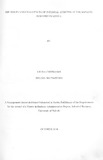| dc.description.abstract | While differences may affect the practice of internal auditing in each environment, conformance with the IIA‟s International Standards for the Professional Practice of Internal Auditing (Standards) is essential in meeting the responsibilities of internal auditors and the internal audit activity. It helps an organization accomplish its objectives by bringing a systematic, disciplined approach to evaluate and improve the effectiveness of risk management, control, and governance processes. The internal audit activity evaluates risk exposures relating to the organization's governance, operations and information systems. The internal auditors are expected to provide recommendations for improvement in those areas where opportunities or deficiencies are identified.
Faced with this scenario and with the current turbulent business environment, the purpose of this study was to establish the roles of internal auditing and the challenges faced by internal auditors in carrying out these roles. The research design employed in this study was descriptive in nature. The target population in the study was the 43 licensed commercial banks in Kenya. Primary data was collected using a semi-structured questionnaire. The study used the quantitative method of data analysis, that is, mean and mode. To ensure easy analysis, and minimize the margin of errors, questionnaire was coded according to each variable.
Based on the findings, the study concluded that the general roles of internal auditing is to provide guarantee that internal controls are efficient, examining and assessing the banks policies, procedures, manuals and recommending best practices and risk evaluation and management. The study further concludes that the challenges faced by internal auditors on their daily operations were those of realigning skills to address new requirements and implementing the new international professional practices framework (IPPF).
The study recommends that the banks should hire auditors from other fields to introduce new techniques in the bank accounts auditing in order to overcome the challenges encountered by the internal auditors in their operations. The study also recommends that there should be continuous training and development of audit staff, in order to enhance their competence and also there should be acquisition of an audit system in all the banks. | en |

